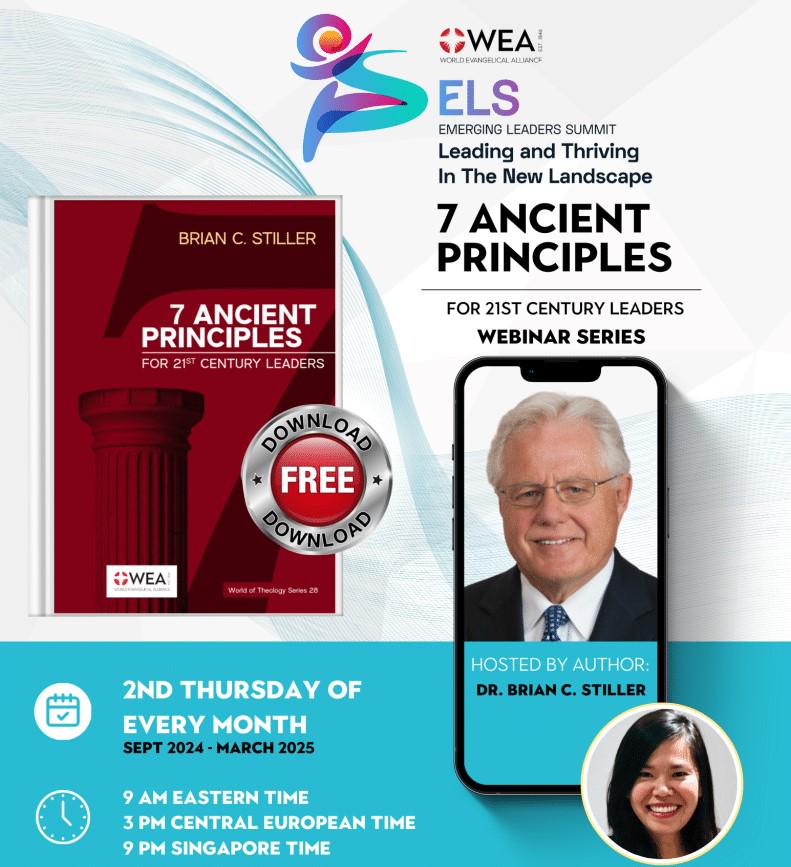On November 14, Dr. Brian C. Stiller hosted a webinar exploring Principle 3: Exercise Your Faith, the third chapter of his book 7 Ancient Principles for 21st Century Leaders. This book draws lessons from the biblical story of Nehemiah to guide leaders in building and renewing organizations and ministries.
Dr. Brian C. Stiller, Global Ambassador for the World Evangelical Alliance (WEA), has a rich history of leadership, including serving as president of Youth for Christ in Canada, the Evangelical Fellowship of Canada, and Tyndale University & Seminary.
This chapter on faith delves into its meaning, importance, practical application, and discernment, intertwining Stiller’s personal experiences and biblical narratives to illuminate these principles.
The session followed a question-and-answer format, with Dr. Peirong Lin, WEA Deputy Secretary General for Operations, moderating the conversation. Stiller addressed the chapter’s main themes while engaging with questions from participants.
Under WEA’s Emerging Leaders Summit: Leading and Thriving in the New Landscape, the webinar was part of a series held every second Thursday of the month from September 2024 to March 2025 at 9 a.m. Eastern Time, learning the seven principles with the author one at a time. The book is available to download as a free e-book.
The Meaning of Faith
In the webinar, Stiller began by clarifying the meaning of faith, contrasting it with hope and belief. According to Stiller, belief resides in the mind and represents the intellectual decision to accept something as true. Hope is tied to emotions, reflecting the aspirations of the heart. Faith is volitional—it is expressed through action and manifests in what we choose to do.
To illustrate this concept, Stiller pointed to the example of Nehemiah. Faith, he explained, took hold of Nehemiah’s life as he devised movements, created plans, and implemented strategies to rebuild Jerusalem’s walls. It was not a passive conviction but an active force that propelled his leadership.
Stiller further elaborated on faith by referencing Hebrews 11:6: “Without faith, it is impossible to please God because anyone who comes to him must believe that he exists and that he rewards those who earnestly seek him.” He emphasized that faith pleases God because it establishes a specific and unique relationship with Him. This relationship arises when faith compels us to act beyond our human capabilities and into a space where success is only possible through God’s empowerment.
He used the story of Joshua crossing the Jordan River to bring this principle to life. God instructed Joshua that the waters would stop only when the priests’ feet touched the river. This required a leap of faith—taking action before witnessing the miracle. Stiller explained that faith involves this element of risk, moving us from where we are into the place where God wants us to be, relying entirely on His enablement.
Nehemiah’s story further underscores this point. Empowered by God’s presence, Nehemiah left Persia for Israel and initiated the monumental task of rebuilding the city’s walls. Stiller connected this to leadership, emphasizing that faith, as a volitional act, operates on two levels: Faith establishes a unique presence with God in our actions, and faith infuses spiritual energy into those we lead.
Discerning True Faith From Blind Faith
Stiller addressed the distinction between true faith and blind faith, emphasizing the importance of grounding faith in three essential elements: Scripture, God’s work in history, and the community of believers.
He also underscored that faith should be logical. While faith often challenges us to step into what seems impossible, it must still carry a sense of possibility that aligns with God’s purposes. For faith to be genuine, it must integrate thoughtful discernment, prayerful consideration, and affirmation from trusted voices within the community of believers.
“Faith is calculated within my service to the Lord as a servant and a thoughtful leader within the community, believing the Bible to be true and that God Himself is present,” Stiller explained. “All of these elements come into play as I think about faith and how the risks we take in moving forward align with what we believe to be the plan of God.”
How to Exercise the Muscle of Faith
When asked how to exercise faith, particularly in challenging circumstances, Stiller emphasized that neither personality nor cultural context should be used as excuses for inaction. He stressed the importance of understanding how one’s personality can operate most effectively within their specific circumstances.
“Finding ways that are particular to the setting, to the personality, to the culture. All of those factors come into play, but not using any of them as an excuse for not allowing faith to be able to be an operative principle in the exercise of my leadership.”
Stiller encouraged participants to start small when practicing faith. He advised returning to the fundamental idea of pleasing God by making choices that invite His presence and align one’s actions with the guidance of the Holy Spirit.
He also highlighted the importance of a thoughtful and intentional approach, urging individuals to take their time, practice consistently, and engage in careful planning.
Practicing Faith in a Secular Organization
One participant asked how to practice faith within a secular organization. Stiller believed that faith can be practiced wherever we are. He explained that the principles of faith remain consistent in both Christian and secular contexts, with the primary difference being the language used.
Stiller advised maintaining personal prayer and thoughtful planning, always trusting in God for empowerment and enablement. He also suggested using faith as a mission approach. “Let them know this is your stand, this is your belief system, but you're not pushing it on them,” he remarked.
Encouragement for Those Facing Difficult Challenges
In the end, Stiller encouraged those dealing with challenges such as natural disasters or persecution. “God has put you where you are because you are gifted, and there's something about you that He wants in where you are today,” he shared.
“He is there with you,” Stiller reassured. While the answers to challenges may not be immediate or obvious, he encouraged trusting in God’s timing and provision, affirming that clarity will come as they continue to walk in faith.












